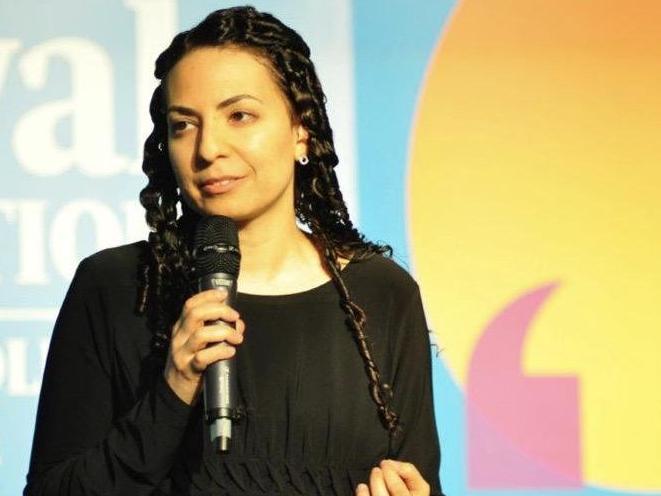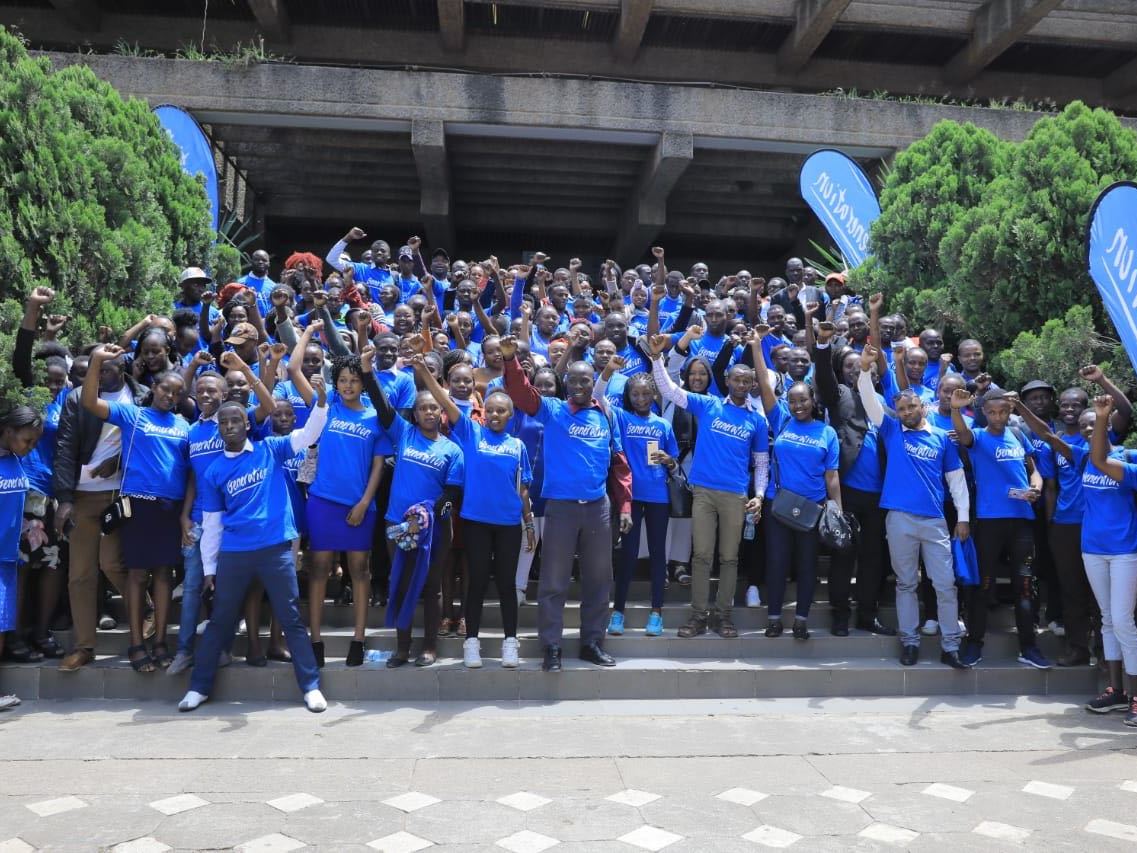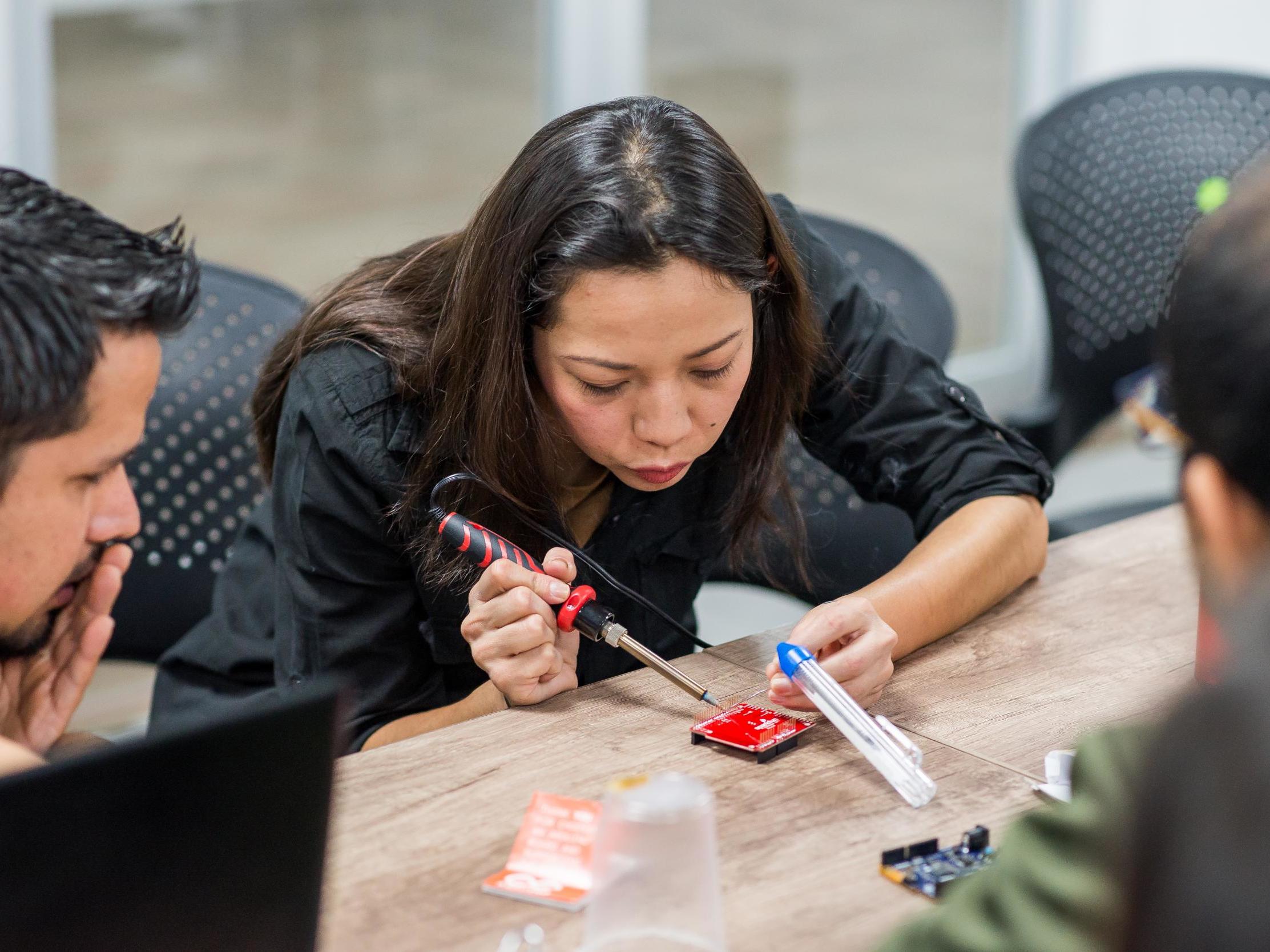The training company creating careers and helping employers fill skill shortages
After coronavirus some companies will see a demand increase while others may shut down altogether, writes Zlata Rodionova. But Mona Mourshed is looking to find people new careers with news skills and create employment ecosystems


For years, there’s been a widening gap between the skills that companies need, those that workers have, and those given by education providers.
As a result, close to 1 million young people are not in education, employment or training – and that’s just in the UK.
Yet employers have a hard time filling entry-level jobs, with 40 per cent saying a skills shortage is the problem.
Mona Mourshed, president and CEO of Generation, a youth employment non-profit founded by McKinsey & Company, wants her organisation to bridge that gap.
Generation is on a twin mission to provide young people with training and thriving careers while helping companies find the talent they need, and deliver a return on investment to employers in ter of business outcomes.
Mourshed tells The Independent: “Our question from the start was: is it possible to create a global programme that trains and places learners in careers, that is both cost effective and that has a return in investment both for young people and for employers?”
It turns out it is. Five years later, her efforts have begun to bear fruit. What started out as a “graduating class” of 1,200 students at the end of 2015 grew to over 36,000 graduates across 153 cities in 13 countries including the US, the UK, Spain, India, Mexico and Kenya.
The inspiration for Generation came when Mourshed, who graduated with a BA from Stanford University and a PhD from MIT, was leading McKinsey’s Global Education Practice in the company’s Middle East office in Dubai, where she spent 10 years becoming the first woman elected partner in the region.
Education has always played a huge role in both her life and that of her family.
“My father grew up in very impoverished conditions. Education was what catapulted him through to university and what got him a scholarship to study in the US,” she says.
“As I was growing up, my parents were always very focused on how you can only be your best self when you are in service of others. So they planted the seed, even though they were hoping I would become a medical doctor! As I grew older, and particularly during my time in the Middle East, I became clear that education was where I wanted to make a contribution.
“Through my work with McKinsey, we initially really focused on supporting young people to have strong literacy and numeracy outcomes but then I realised that just because someone graduates from school doesn’t mean that they’re going to be ok and be able to afford a home and provide for their family.”
“That’s when I was drawn to the education-to-employment journey, and how to systematically help learners get to a career that would otherwise be beyond their reach.”
Her team evaluated over 150 education-to-employment programmes in 25 countries to create their own model.
Learners are typically secondary school graduates who have fallen through the cracks when it comes to training for jobs
“There were terrific programmes out there, but they tended to be small and those that would train people at very large volumes would typically have an employment rate of 40 per cent or below,” she says.
According to Mourshed, Generation has an 80 per cent job-placement rate within three months, and at the one-year mark, nearly 70 per cent of our graduates continue to be on the job.
So how does it work? The team first confir job vacancies with employers before the training begins. The programme itself lasts between four and 12 weeks, depending on the job’s sector which includes tech, healthcare, customer service and skilled trade among others.
“We always start by looking at the challenge the business is facing. In doing that, there’s also the potential to increase the diversity of their workforce and to contribute to the community,” she adds.
One of Generation’s main priorities is keeping its training programmes accessible. Learners are typically secondary school graduates who have fallen through the cracks when it comes to training for jobs, and dropped out of higher education for financial or personal reasons.
They often include young people from minority groups or underprivileged backgrounds.

Depending on the demographic the organisation is serving, which varies across countries, Generation offers mentorship and a stipend as well as help towards transportation costs.
Mourshed, who has a dual US and Egyptian nationality, says her team is also constantly trying to push the barrier when it comes to who can actually apply for the jobs on offer.
“If the role requires a university degree, we’re always looking to see if we can stretch that for the employers to take in someone with a secondary school or a vocational background instead. Or if it’s a male-dominated profession, we’ll make sure that we can get a women who is as qualified do the job. If it is a profession where typically the representation of people of colour is limited, we’ll try change that and broaden what the diversity profile looks like.
“Our typical employers are the ones facing challenges including productivity and scarcity. They will be the ones who have what we call a high desperation index and they will be more willing to embrace an alternative profile.”
Mourshed currently also leads global social responsibility at McKinsey & Company, spearheading initiatives spanning responsible business practices, sustainability and giving back to communities.
In 2011, she was selected as one of the Fortune 40 Under 40, an annual selection of the most influential people in business. She has also received a Wise award in 2018, which recognises and promote six successful innovative projects each year that are addressing global educational challenges. However, its her work with Generation and the direct impact it has on graduates that she is the most proud of.
The pandemic has completely upended our work, like it has for many organisations. Navigating our way through this crisis feels like something that happens once every hundred years
“My proudest moment is when my team and I have been a part of changing our learners’ life trajectory. When because of their education background or socioeconomic situation, our learners were facing all kinds of bias and challenges. And Generation helped break out of that cycle and get them into a job that was otherwise out of their reach,” she says.
When The Independent met Mourshed in February, she was focused on getting traction for Generation’s new programme, called ReGeneration, which trains and places mid-career learners who might have lost their jobs due to automation or digitisation.
Sadly, the coronavirus outbreak fundamentally changed the unemployment landscape across the world and Mourshed admits it has been one of the most difficult moments of her career.
“The pandemic has completely upended our work, like it has for many organisations. Navigating our way through this crisis feels like something that happens once every hundred years.”
A report by the International Labour Organisation recently estimated that 200 million people will lose their full-time jobs within the next three months due to Covid-19, on top of the 200 million who are already unemployed.
This means that the work of employment non-profits such as Generation and others has gone from being niche to now suddenly being mainstream and more important than ever.
“We used to be focused on only those who face systematic barriers to employment like youth with a secondary school degree and little work experience or a mid-career worker who just lost their job and needs to start over in a different profession.

“And now it’s clear that we need to have solution for a much more diverse group of ‘unemployed’ and be able to rapidly deploy our programmes in person and online across professions in order to contribute to the solution,” she adds.
Generation’s first response to the crisis was to suspend all its in-person programmes around the world and making sure both colleagues and learners were safe.
The second was about continuing teaching its current cohorts online, and rapidly accelerating the development of their online programmes for professions that are in demand due to the pandemic.
“As Covid-19 spread, we sought to deploy this skill to the population that needed it the most: healthcare frontline professionals.”
Its work began in Italy, where the team developed eight hours of online modules – for personal protective equipment use, non-invasive ventilation, and stress management under emergency conditions – within three weeks.
The course was approved by the Ministry of Health and launched on the website of the national nursing association this month. In Italy, Generation has had 18,600 nurses access the content to date and 66 per cent have already successfully completed the course and accredited assessment and Mourshed is now doing the same in other countries as well.
As we start to look towards recovery there will be plenty more for Generation to do.
While Covid-19 may force some employers to shut down, others are accelerating their automation plans. At the same time, some jobs might experience a demand surge and will be crucial to reopening economies across the world.
Mourshed says: “The high numbers of unemployed people mean that we need a high volume of jobs available in short order. So we have to start thinking about employment ecosystem rather than specific companies.
“An example of an employment ecosystem could be a tech company selling software and system tools. To grow its business, the company needs to ensure that its customers and partners can hire employees who know how to use its products. Another example of an employment ecosystem is an anchor employer and their supply chain.
“In both cases, the ecosystem comprises companies of all sizes; and, the job tide rises (or falls) simultaneously across the network.”
Join our commenting forum
Join thought-provoking conversations, follow other Independent readers and see their replies
Comments